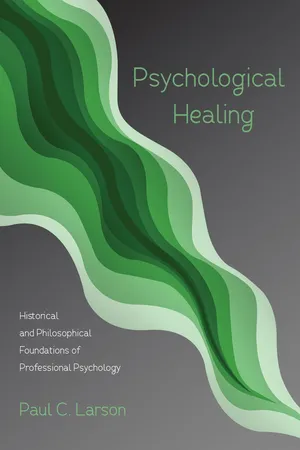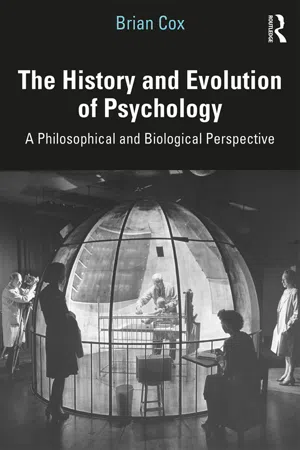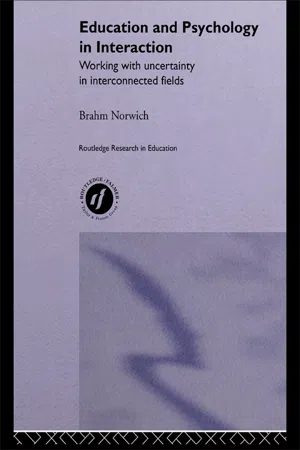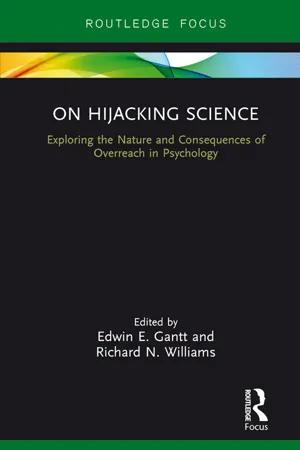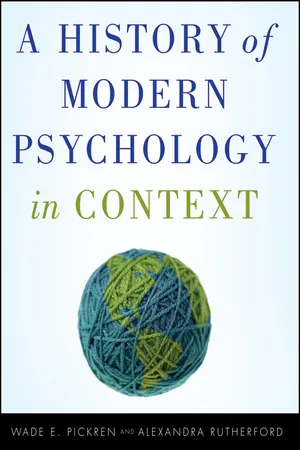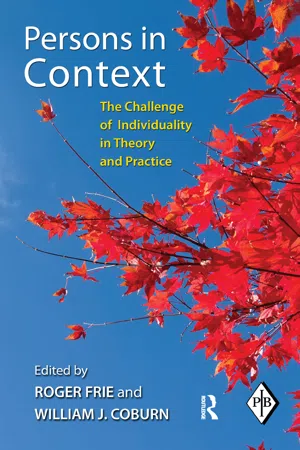Psychology
Emergence of Psychology as a Science
The emergence of psychology as a science refers to the historical development of psychology from a philosophical and speculative discipline to a more empirical and scientific one. This transition was marked by the adoption of scientific methods, such as experimentation and observation, to study human behavior and mental processes. Key figures in this emergence include Wilhelm Wundt, who established the first psychology laboratory in 1879.
Written by Perlego with AI-assistance
Related key terms
Related key terms
1 of 4
Related key terms
1 of 3
12 Key excerpts on "Emergence of Psychology as a Science"
- eBook - ePub
Psychological Healing
Historical and Philosophical Foundations of Professional Psychology
- Larson(Author)
- 2017(Publication Date)
- Resource Publications(Publisher)
8Founding Psychology: Science and Profession
The new field of psychologyW e are now at the beginning of the science of psychology as an independent discipline among the sciences. The profession of psychology has its beginnings in this period as well, though the number of psychologists doing any applied practice was minimal. That story will be told in the next chapter. Research and teaching were the dominant activities. Acceptance of professional roles within psychology was much slower both among psychologists and the public. Psychology as a science emerged in the latter half of the twentieth century as the natural sciences were in their great period of branching off into specific disciplines. As noted in the previous chapter, German educational reform led to the Ph.D. being the major degree for scholarly research, so American universities began granting the doctorate, and newly minted Ph.D. in psychology from German universities became professors at American universities.There are three paths that led to the emergence of psychology as a separate discipline. One was from philosophy, another was from education (pedagogy), and the other from physiology and medicine. Education as a discipline was emerging as well, but at this time the philosophical roots more evident than empiricism. For our purposes here education and philosophy can be taken together as they fit the archetype of teacher and both use words as the primary medium for conveying knowledge through dialog. In many ways these still represent two poles within psychology, the natural science tradition from physiology and the human science tradition from philosophy. Most of the early psychologists came from one or the other of these fields and found the new discipline the place where there interests were better served than the discipline of the formative parts of their careers. Within psychology, it was quite clear from the start, that the new discipline was to be an experimental science. To the extent that someone wanted to work with patients in a clinical context, you still had to get training as a physician. - eBook - ePub
The History and Evolution of Psychology
A Philosophical and Biological Perspective
- Brian D. Cox(Author)
- 2019(Publication Date)
- Routledge(Publisher)
I might as well be explicit at this point. I believe that psychology was made possible by two revolutions. First, the philosophical scientific revolution, in which such philosophers as Descartes and Locke made it possible for us to examine the world and ourselves through observation, reflection and logical argument, instead of the appeals to authority that characterized thought in the Middle Ages. Second, perhaps the most momentous revolution in science occurred in the mid-19th century, first with the materialist emphasis on physiochemical explanations for mind and body and then the Darwinian revolution that followed immediately. All of the subsequent changes in psychology, from psychoanalysis to behaviorism, followed from these revolutions.This is not to say that by these revolutions psychology acquired a stable paradigm immediately or easily. In fact, for much of its history, psychology did not have “universally recognized scientific achievements that for a time provide model problems and solutions for a community of practitioners.” Instead, psychology was characterized as what Kuhn calls a preparadigmatic science.In this phase of historical development, the scientific community is fractured. They argue not about results, but about philosophy. During the period of time covered by this book, psychologists argued about what psychology should be about, what methods should be used and what should count as acceptable data. In the preparadigmatic period of a science, books are written that are long on philosophical speculation and short on results. They are trying to state their position and win converts to it. Compare, for example, these two statements, the first by the great 19th-century psychologist and philosopher William James (see Chapter 7 ) and the second by the behaviorist John B. Watson (see Chapter 8 ):Psychology is the Science of Mental Life, both of its phenomena and of their conditions. The phenomena are such things as we call feelings, desires, cognitions, reasonings, decisions and the like and superficially considered, their variety and complexity is such as to leave a chaotic impression on the observer.( James, 1890/1983, p. 1)Psychology as the behaviorist views it is a purely objective experimental branch of natural science. Its theoretical goal is the prediction and control of behavior. Introspection forms no essential part of its methods, nor is the scientific value of its data dependent upon the readiness with which they lend themselves to interpretation in terms of consciousness.(Watson, 1913, p. 158) - eBook - ePub
Psychology in Historical Context
Theories and Debates
- Richard Gross(Author)
- 2017(Publication Date)
- Routledge(Publisher)
Chapter 2 Scientific perspectives Psychology as the study of … how?We learned a number of things about Psychology from Chapter 1 , including the following:● Its emergence as a separate discipline took place during the late 1800s, with its roots in philosophy and physiology in particular.● A number of different schools of thought or theoretical perspectives/approaches appeared between this time and the mid-1900s, often as a reaction to/against an already existing approach and often overlapping with it.● Different schools of thought have tended to be more or less dominant within particular parts of Western Europe and the US, reflecting both scientific/academic and more general social influences and traditions.● It’s more accurate to talk about the ‘histories’ of Psychology, rather than a single, universally accepted ‘history’ taken to reflect ‘what actually happened’.● These different approaches focus on different aspects of ‘human functioning’ (i.e. their subject matter); it’s almost as if human beings are being defined differently according to which theoretical lens we happen to be looking through. This relates to ontology: the branch of philosophy concerned with the fundamental characteristics of reality: what exists. According to Teo (2009), Psychology has excluded or neglected key problems or pretended they don’t exist (see Box 2.1 - eBook - ePub
Neural Geographies
Feminism and the Microstructure of Cognition
- Elizabeth A. Wilson(Author)
- 2016(Publication Date)
- Routledge(Publisher)
2 The Origins of Scientific Psychology DOI: 10.4324/9781315865799-3The question of psychology's status as a scientific domain is one that simply will not go away. Despite more than a hundred years of established laboratory experimentation, despite the development of many unambiguously scientific paradigms (behaviorism, cognitive psychology, neuropsychology, perceptual psychology), despite the institutional demand for empirical procedure, the question How scientific is psychology, really? remains curiously unresolved. It is supposedly the historical choice of science over philosophy that marks the birth of modern psychology (Boring 1957 ); yet this modern-day psychology finds itself unable to affirm this choice and secure its position as a science (Koch and Leary 1992 ). Never quite scientific enough, yet clearly too scientific for some, psychology finds itself caught in a dilemma of identity that has been variously described as inhibiting, paralyzing, or self-destructive.In this chapter, the nature of psychology's identity as scientific will be examined. How is a scientific identity procured for psychology? What exclusions and fixations are necessary for the maintenance of such an identity? My initial concern will be to argue that psychology is enabled rather than damaged by this “crisis” in its scientific identity. While the most common responses to psychology's uncertain scientific status have been either to move psychology out of the domain of science altogether (e.g., Robinson 1992 ) or to insist on an ever more rigorous and thorough application of scientific principles (e.g., Giorgi 1992 ), I will maintain that it is the very negotiation between the scientific and the nonscientific that produces an identifiable psychological domain. This means that psychology's location with respect to both science and interpretation remains undecidable. This undecidability is not a secondary or exterior effect, which is brought to bear on an already existing psychological domain; it is not a condition against which an already formed psychology could struggle. Rather, this undecidability is the condition that establishes psychology as such. Consequently, the pertinent questions about the identity of psychology as scientific may be less questions of whether one is for or against - eBook - ePub
Education and Psychology in Interaction
Working With Uncertainty in Interconnected Fields
- Brahm Norwich(Author)
- 2002(Publication Date)
- Routledge(Publisher)
Gage defends the contribution of empirical work from a technical perspective which aims to find out what interventions can improve learning outcomes under what conditions. This is in a different tradition to Harre et al.’s programme, which assumes that ‘systematic, careful, sceptical and rigorous scientific research could be used to extend and correct the domain of common sense psychology’ (Harre et al., 1985, p. 15). This is the fourth possible relationship between common sense and psychology. In this version the task of systematic study is to make explicit the psychologies of every day and then undertake empirical study in the light of this understanding to develop and extend this body of knowledge. Harre et al. summarise this position neatly by referring to common sense as the literature, as that part of the body of knowledge available to the systematic study of psychology. This conception of psychology as a systematic field of study has much to commend it because it retains a critical distance for psychology from everyday notions and assumptions while recognising their interdependence and interaction. However, it does not address issues concerned with what is implied and required by calling a systematic study ‘scientific’. Nor does it provide a perspective on how everyday or folk psychology interacts with the systematic study. These issues arise because everyday psychology is a complex mixture of notions and assumptions which have been developed over the years in response to how people lead their lives on a day-to-day level, but also in response to wider issues about our origins and place in the universe. This inevitably leads to philosophical questions which will be dealt with briefly in the next section.Philosophical ideas of psychology as science
Much has already been said about the lack of theoretical unity in psychology and the aspirations for a scientific treatment of the field. Science has assumed considerable importance in Western societies and is considered to be one of the great human achievements of the last two centuries. There is no doubt about its impact on our understanding of the natural world and therefore our place in it. It has also influenced our technologies and had an immense impact on all areas of our lives. It is hardly surprising that the study of social and psychological affairs should adopt some, if not all, of the hall-marks of this successful endeavour called science. The problems arise because there are uncertainties about whether the characteristics associated with the more successful empirical sciences, such as physics or biology, are applicable to the study of human experience and actions. Central to these sciences are assumptions and methods which are considered to hold the key to explanatory success. One assumption is the autonomy and authority of facts. Facts relate to what is the case and form the basis for deriving and testing explanations of phenomena and predictions of the future. Scientific methods, which are designed to be well defined, systematic, objective and clear, are central to this process of comparing ideas and explanations with evidence. The knowledge derived from these systematic empirical methods is open to revision, and therefore the scientific method is considered to have the power to self-correct and adapt to new circumstances and fields. Though the idea of science is associated with these methods, they have to be judged in terms of their adequacy for the aims of science. These are theoretical aims: to enhance understanding and explanation. - eBook - ePub
Knowledge
The Philosophical Quest in History
- Steve Fuller(Author)
- 2015(Publication Date)
- Routledge(Publisher)
3 Epistemology as psychology of scienceIn the beginning the psychologist was the self-conscious scientist
Experimental psychology began as the psychology of the scientist, specifically the pivotal role that intersubjective differences in astronomical observation – the so-called personal equation – played in laying the foundations of psychophysics in the mid-nineteenth century (Boring 1950: 31). It was assumed that science’s special epistemic powers resulted from scientists’ heightened self-consciousness about human cognition in general. This assumption was taken in two different directions in the early twentieth century. The first, championed by John Dewey (1910), amounted to advising teachers that children should be exposed to the “scientific method” (i.e. hypothesis testing) in order to learn how to think. The second, relevant to the subsequent development of psychology as a discipline, was that scientists may be expected to be more articulate about what non-scientists always already do whenever they think. This view, shared by the physicists Max Planck and Albert Einstein, justified the Würzburg School’s controversial application of the introspective method to themselves and each other, very often using complex philosophical problems as stimuli (Kusch 1999). Here it is worth recalling psychology’s dual institutional origins as the applied wing of the philosophy faculty and the theoretical wing of the medical faculty, which helps to explain the pivotal role of William James, someone trained in medicine who migrated to philosophy where he established a psychology laboratory (Ben-David and Collins 1966; Bordogna 2008).These early Würzburger steps in what is now called “cognitive psychology” were followed up in the 1920s and 1930s by the Gestalt psychologists Otto Selz and Karl Duncker, who departed from their Würzburg forebears in clearly separating the experimenter and subject roles. (As we shall see in the next chapter, Karl Popper was a fellow-traveller who was distinctive in returning to philosophy.) They studied scientists’ notebooks to construct general testable accounts of problem-solving (Petersen 1984; Wettersten 1985). Moreover, the Gestalt thought leader Max Wertheimer (1945) probed the directive nature of Einstein’s own discovery process in a quarter-century correspondence with the revolutionary physicist. This work in turn inspired the field of “protocol analysis” and other techniques to infer thought processes from verbal behaviour that are still used by a wide range of psychologists today (Ericsson and Simon 1985). - eBook - ePub
Taking It Big
C. Wright Mills and the Making of Political Intellectuals
- Stanley Aronowitz(Author)
- 2012(Publication Date)
- Columbia University Press(Publisher)
5 On Social Psychology and Its Historical Contexts The Origin of Psychology as an Independent DisciplineThe disciplines of social science made a relatively late entrance in Western thought. For centuries after Galileo and Copernicus forged the contours of modern physical sciences, social relations were considered beyond the scope of the sciences. Consequently, as late as the nineteenth century they were taken as objects of political and moral philosophy; natural science tried to reduce society and social relations to the categories of physics and biology, a tendency that has, in recent years, been revived by the reductionist wing of the discipline of neuropsychology, whose advocates believe that we can discover the sources of virtually all emotional and mental phenomena in the brain. The situation was so dire for the development of the autonomous social sciences that Émile Durkheim, one of the founders of modern sociology, insisted, at the turn of the twentieth century, that society be considered a “social fact,” a declaration that signified its refusal to be reduced to natural science. Similarly, although from different premises, Wilhelm Dilthey made the argument that the methods of the natural sciences were inapplicable to the human sciences because, in contrast to the objects of the physical world, humans interact with one another on the basis of subjectivity. On the other hand, whereas Max Weber held that the object of sociological investigation was to achieve “understanding”—a formulation that followed the neo-Kantian view that the nature of human interactions precluded scientific reduction—Durkheim followed natural scientific thinking in his determination to discover “laws” of human relations that were specific to its own level of reality.1Until the later decades of the nineteenth century, only political economy, psychology, and ethnology (later termed “anthropology”) enjoyed a degree of recognition in academic institutions. What studies that are now called sociology and political science were subsumed under the terms “social and political philosophy.” Political economy’s birth as a legitimate intellectual discourse coincided with the rise of industrial capitalism, but its origins went back to Aristotle’s Politics - eBook - ePub
On Hijacking Science
Exploring the Nature and Consequences of Overreach in Psychology
- Edwin E. Gantt, Richard N. Williams(Authors)
- 2018(Publication Date)
- Routledge(Publisher)
What about the other mainstay of scientism: physicalistic reductionism? Where does the Lilienfeld et al. (2018) text stand on that? This textbook includes and reflects many studies of genuine psychological processes that are not in any way reduced to neurology, demonstrating that there is much uniquely psychological research developing in our field. Many of the advances toward genuine psychology noted earlier are reflected in this text. Stress, along with many phenomena, is considered “a subjective experience” (p. 456). Relational processes such as when a person “tends and befriends” threatening situations (p. 459) are commonly reported. Voluminous research is reported on the value of strong interpersonal relationships (p. 461), agentic control of one’s environment (pp. 461–463), commitment to life and work (p. 464), flexible ways of coping (p. 465), and even spirituality (p. 465)—all properly psychological. However, expansive coverage of neuroscience is prominently featured in every chapter and is considered identical with psychology. In fact, the authors consistently assume throughout the text that mental life and the brain are identical, revealing the assumption that warrants the equation of neuroscience and psychology and the lack of differentiation of subject matter between biology and psychology. Indeed, the growing approach of biological psychology is given a special privilege and considered to be the gold standard school of psychology. The identification of psychological life and the brain is never critically evaluated despite an extreme emphasis on critical thinking, which instead challenges human experience and science that falls short of the ideals of experimental methodology. The study of psychological phenomena by means of neuroscience is a prominent if not the preeminent aspirational goal of the entire discipline. The very existence of any psychological phenomenon is viewed as most strongly supported when neuroscience is able to identify its manifestation in the brain. In other words, although psychological processes are investigated in research throughout psychology, these studies are part of a scientific project whose ultimate aim and promise is to explain them neurologically.There is a connection between the two unquestioned philosophical assumptions of scientism: the metaphysical physicalism and the epistemological positivism. Even though psychological processes are researched and theorized as such, the methodological orthodoxy requiring causal hypothesis, operational definition of variables, statistical analyses, and causal inference already treats mental life as if it were a physical thing that could be objectified, manipulated, measured, and quantitatively analyzed. Phenomenological philosophers have shown how the ontological and epistemological assumptions involved here are unified in the uncritically assumed position of naturalism (Husserl, 1954), which continues to pervade the way psychology is introduced and taught. From this it follows that even as genuine psychology has been emerging in our discipline over its history, the methodological tyranny of scientism drives the discipline toward a naturalization of psychological phenomena that prepares the way for eventual biological reductionism, hence increasingly prominent and encroaching status of biological psychology. - eBook - ePub
- Wade Pickren, Alexandra Rutherford(Authors)
- 2010(Publication Date)
- Wiley(Publisher)
CHAPTER 3 SUBJECT MATTER, METHODS, AND THE MAKING OF A NEW SCIENCE—Psychology is to be treated as a natural science in this book. This requires a word of commentary.William James, Psychology: Briefer Course, 1892INTRODUCTION
Two of Psychology’s biggest challenges in the process of becoming an authoritative science in the late 19th century were (1) to delineate and define its subject matter and (2) to develop an appropriate method for the systematic study of this subject matter. For the new psychologists, one solution lay in treating Psychology as a natural science. This meant developing a rigorous method that would establish a clear break with mental philosophy (a topic we cover in the next chapter), despite overlap in the subject matter of interest to both psychologists and philosophers, such as the will, consciousness, habits, and other processes of the mind. A rigorous method would determine whether Psychology could become equivalent in scientific legitimacy to its natural science counterparts such as physics and chemistry. Underlying the search for this method was the very question of whether the study of what was called the mind, the soul, and later, conscious experience and mental processes could ever be conducted scientifically, a question we introduced in Chapter 1 . Several major philosophers had argued that this kind of subject matter could not be subjected to rigorous scientific analysis. Their arguments were based on specific beliefs about the nature of science and the nature of mind. In the first part of this chapter, we review several of these arguments and the work that subsequently challenged these beliefs. Interestingly, it may have been those who argued against - eBook - ePub
Early Childhood Studies
A Social Science Perspective
- Ewan Ingleby(Author)
- 2012(Publication Date)
- Bloomsbury Academic(Publisher)
1 Psychology and Early Childhood StudiesChapter outline Introduction Defining the discipline of psychology Origins of psychology The schools of psychology Behaviourism Humanism Psychodynamic theory Cognitive theory Biological psychology Applying psychology to early years Psychological therapies and the early yearsLearning outcomes After reading this chapter you should be able to:Introduction• identify what the term psychology means;• analyse some of the ways that psychology can be used by early years practitioners;• critically appraise some of the ways that psychology can be applied to early years.This chapter develops your knowledge and understanding of selected psychological theories accounting for children’s growth and development. The material in the chapter explores the idea that an increased awareness of applied psychology enables children to achieve their full potential.This opening chapter of the book introduces you to the discipline of psychology and discusses how psychology can be applied to early years in order to improve practice. Each school of psychology has a different understanding of what constitutes the self. This understanding is outlined, analysed and critically appraised in order to explore how psychology can be applied to the early years. Throughout the chapter there are formative activities that reinforce learning in relation to the main psychological models that are of relevance for early years practitioners.Defining the discipline of psychologyReflective Activity 1.1 What is your understanding of the word psychology? FeedbackPsychology is an academic discipline that studies a vast range of human and animal behaviour. Psychologists are not mind readers and they do not necessarily have access to our thoughts. They do not work solely with people who are mentally ill or people who are emotionally disturbed. These are common delusions and misinterpretations of the discipline. - eBook - ePub
- Guido Villa(Author)
- 2014(Publication Date)
- Routledge(Publisher)
Gebilde ), such as perceptions, emotions, and volitional processes, and also the connections between them. Wundt goes on to consider how these mental processes have formed themselves in the individual and in the species, and, lastly, endeavours to establish the laws of Psychology by means of some few general principles which govern the development of all mental processes.Horwicz.To this period belongs the psychologist Adolph Horwicz, who also attempted a complete treatment of psychic phenomena based on the results of physiology. His Psychological Analyses founded on Physiology were published in three volumes between 1872 and 1878.1 The work, though possessing undoubted merit, is obscure and unmethodical, the author, while professing to be guided by pure experience, launching forth into general theories, and pushing his anti-intellectualism to the point of considering feeling as the primitive faculty of mind and the “direct expression of the soul’s impulse towards self-preservation.”Spencer.Psychology was meanwhile making great progress in England as well as in Germany. Foremost in the rank of psychologists in England are Spencer and Bain. Herbert Spencer was the first to develop the theory of a progressive evolution of consciousness parallel to that of living organisms. Spencer’s Principles of Psychology is the application of the philosopher’s general ideas to a special branch of experience rather than a study of mental phenomena empirically considered. His dominating notion is the principle of evolution as set forth in his First Principles . In his Principles of Psychology 2 are comprised a synthetical and an analytical part, preceded by a study of the data and inductions of Psychology. Spencer examines first of all the nervous system, which is the sine quâ non of consciousness, and is of opinion that the object of Psychology consists in determining the connection between the series of physical phenomena and the corresponding series of mental phenomena. The individual cannot be considered as an abstract psychic entity, but as what he really is—viz. a psychophysical being, who has to adapt himself to his surroundings. Therefore there can be no sharp distinction between Biology and Psychology, for there can be no interruption in evolution, which is a universal and continuous process observable in every form of existence. Life consists in a perfect harmony between the outer and the inner worlds. Thus consciousness, like the bodily organism from which it is inseparable, is subject to a progressive evolution from simpler to more complicated forms, or, as we may say, from a homogeneous to a heterogeneous form. Spencer in his general synthesis studies the evolution of consciousness with regard to its several aspects of space, time, speciality, complexity, and so forth; in his special synthesis - eBook - ePub
Persons in Context
The Challenge of Individuality in Theory and Practice
- Roger Frie, William J. Coburn(Authors)
- 2011(Publication Date)
- Routledge(Publisher)
Part 3Developmental contextsPassage contains an image
Jeff Sugarman and Jack MartinChapter 5Persons acting in worldly contextsGiven the mission of disciplinary psychology to explain human behavior across the variety of social, cultural, and biophysical contexts in which it occurs, it might be expected that the focus of psychological investigation is persons acting in worldly contexts. However, historically and currently, seldom is such the case. Introspective, cognitive, and biological psychologies have taken the focal phenomena of interest to be thoughts, mental forms and functions, or neurophysiological structures and processes. Functional and behavioral approaches to psychology have investigated human behavior, but restrictively so, as responses of research subjects to highly contrived tasks in “stripped down” experimental settings purposefully denuded of practical, cultural, and historical relevance. Psychoanalytic, humanistic, phenomenological, and existentialist traditions frequently have been preoccupied with the inner experiences, desires, and tensions of persons rather than with their activity in the everyday contexts in which their lives are composed. Even evolutionary psychologists, who might be expected to emphasize the worldly activity of persons when theorizing about psychological selection and adaptation, appear instead to favor a combination of narrative speculation and mathematical modeling. As this brief synopsis shows, past and present psychological scientists have looked to explain individual human action and experience primarily through an interior mentalistic focus or environmental restriction and simplification, not in terms of persons acting in everyday worldly contexts.Despite the ascent of psychology over the last century to the scientific legitimacy it currently enjoys, claims as to the success of its disciplinary mission are less than compelling. Research in social, personality, developmental, industrial-organizational, and psychometric psychology has met with disappointment when persons routinely fail to behave in everyday situations as would be predicted by their self-reports, performance on psychological instruments, or observed responses on experimental tasks. Cognitive scientists continue to be vexed by frame problems and associated difficulties that severely restrict the explanatory value and applicability of their models and simulations in real-world contexts. Clinical, counseling, forensic, school, and other professional psychologists have been reconciled to administering assessments and implementing interventions that boast only limited predictive success, with levels of diagnostic and prognostic accuracy other health-related sciences would find unacceptable. Over the sum of psychological research, there is an absence of findings shown to be robust across the myriad social, cultural, historical, and biophysical contexts.
Index pages curate the most relevant extracts from our library of academic textbooks. They’ve been created using an in-house natural language model (NLM), each adding context and meaning to key research topics.
Explore more topic indexes
Explore more topic indexes
1 of 6
Explore more topic indexes
1 of 4
